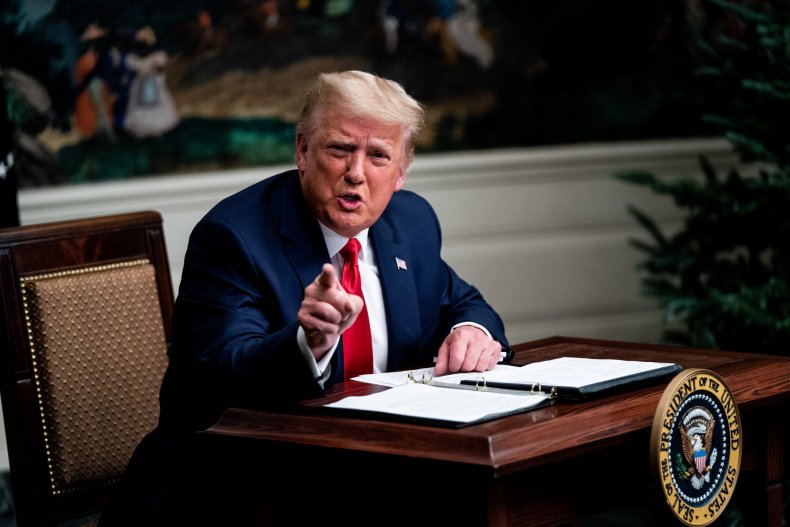An ageing U.S. law that facilitated the rise of Facebook, Twitter and YouTube has once again been thrust into the spotlight this week after President Donald Trump said that it should be “terminated” over national security concerns.
The legal provision, Section 230 of the Communications Decency Act of 1996, is facing growing opposition from both sides of the political divide, despite claims from social media and tech giants that it is critical to their continued existence.
Section 230 offers a degree of immunity to websites for any content uploaded by third parties—be it in the form of a social media post, classified ad or user review.
It gives sites acting in “good faith” the protection to remove any objectionable material, regardless of whether it is “constitutionally protected.” The law is broad, saying that the rules apply to any “provider or user of an interactive computer service.”
Section 230 does not offer a total blanket protection, however, and exemptions are in place meaning lawsuits are possible for criminal and intellectual property cases.
What does the legalese mean in reality? It means the platforms can let users post status updates, product reviews, forum messages or upload videos without having to vet or pre -approve the content, and without fearing it could result in a lawsuit.
In theory, a lack of Section 230 protection would mean websites and users have to aggressively monitor the content being shared online—a radically different business model to many of the mainstream social media or tech companies that are structured around user-generated content over a paywall or subscription service.
“Given the sheer size of user-generated websites it would be infeasible for online intermediaries to prevent objectionable content from cropping up on their site,” the Electronic Frontier Foundation, a digital rights organization, explains online.
“Rather than face potential liability for their users’ actions, most would likely not host any user content at all or would need to protect themselves by being actively engaged in censoring what we say, what we see, and what we do online.”
While it has been referred to as the backbone of the modern internet, calls to revoke or reform the provision are growing among both Democrats and Republicans.
While they have different reasons, both President Donald Trump and President-elect Joe Biden have both voiced the opinion that Section 230 should be revoked.
Trump has suggested social media sites are censoring conservative voices, including his own, while Biden previously told The New York Times the law needed changing as the platforms have played a key role in the spreading of viral misinformation.
Senator Josh Hawley (R-MO) tweeted in May that Facebook and Twitter should be seen as publishers if they continue to “editorialize and censor.”
That same month, President Trump unveiled an executive order declaring Section 230 needed to be clarified as the social networks were now too powerful.
It read: “Section 230 was not intended to allow a handful of companies to grow into titans controlling vital avenues for our national discourse under the guise of promoting open forums for debate, and then to provide those behemoths blanket immunity when they use their power to censor content and silence viewpoints that they dislike.”
Facebook CEO Mark Zuckerberg , Google CEO Sundar Pichai and Twitter CEO Jack Dorsey testified in the Committee on Commerce, Science, and Transportation last month, a hearing that questioned if 230 immunity enabled “bad behavior .”
Out of the trio, it was Zuckerberg who voiced support for the law to be updated, noting that politicians on both sides were “unhappy with the status quo.”
“I believe Congress should update the law to make sure it’s working as intended. We support the ideas around transparency and industry collaboration that are being discussed in some of the current bipartisan proposals,” Zuckerberg said, adding he would be “ready to work with Congress” on shaping any future regulation.
It remains to be seen if the internet law will be “terminated” under the incoming Biden administration, as Trump has urged. As noted by Reuters, only Congress can change Section 230. While some proposals exist, no decision is likely until next year.
Federal Communications Commission (FCC) chairman Ajit Pai said October 15 that his agency had the “legal authority to interpret Section 230,” but it was unclear whether any changes were imminent, and the move was criticized by Democrats.
As noted by The Wall Street Journal Thursday, the decision will now fall on Biden’s FCC pick. The president-elect has not formally proposed a Section 230 repeal.
And while there appears to be consensus among politicians that some aspects should be clarified, it’s clear that an broad agreement in Congress is unlikely.
“Repealing it outright is not viable,” Representative Anna Eshoo (D-CA) said last month, although conceded it will “be on the agenda next Congress.”
Democratic Senator Ron Wyden , who originally co-authored the 1996 provision, blasted Republicans’ arguments about revoking the Section 230 provision after the trio of tech giant bosses testified before the c ongressional committee on October 28.
“I don’t believe my Republican colleagues have read the First Amendment, let alone Section 230. Their obsession with forcing private companies to print misinformation, lies and hate speech is unconstitutional,” Sen. Wyden said in a statement.
Experts have previously told Newsweek it is unlikely Section 230 will be revoked, and will instead see amendments or clarifications to the current provision.
Angelo Carusone , CEO of watchdog Media Mattes, told Newsweek: “Modifications to it or additional laws that both establish more legal safeguards for negligence in addressing extremism, dangerous disinformation and other inauthentic activity—as well as liability for violating those safeguards—is extremely likely.”

p:last-of-type::after,.node-type-slideshow .article-body>p:last-of-type::after{content:none}]]>


Comments